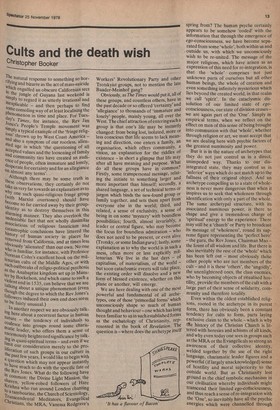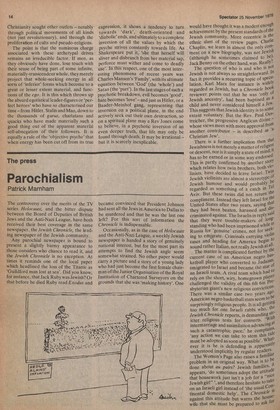Cults and the death wish
Christopher Booker
The natural response to something so horrifYing and bizarre as the act of mass-suicide which engulfed an obscure Californian sect in the jungle of Guyana last weekend is sirnply to regard it as utterly irrational and inexplicable — and then perhaps to find some consoling way of at least localising the Phenomenon in time and place. For Tues'31,aY's Times, for instance, the Rev Jim Jones's People's Temple movement was s.1.111131V a typical example of the 'fringe religlons thrown up by West Coast America — and also a symptom of our rootless, alienated age in which 'the questioning of all accepted values and the loosening of family and community ties have created an audience of people, often immature and lonely, uesnerate for certainty and for an allegiance On almost any terms'. Although there may be some truth M these observations, they certainly do not take us very far towards an explanation as to Why one such quasi-religious fringe group (With Marxist overtones) should have !2'ecome so far carried away by their grouPIdentity as to destroy themselves in this alarming manner. They also overlook the undeniable fact that not wholly dissimilar associations of 'religious fanaticism and Fa. tasrrophic conclusions have littered the nistory of human society in places far rernoved from California, and at times less Obviously 'alienated' than our own. No one !Ili() is familiar, for instance, with Professor orm au Cohn's excellent book on the millenarian cults of the Middle Ages, or with such outbreaks oi religio-political psychosis as the Anabaptist kingdom set up in Munster by Bockelson, and which came to such a violent end in 1535, can believe that we are talking about a unique phenomenon (even !hough the degree to which the Rev Jones's followers induced their own end does seem to be fairly unusual.) In another respect we are obviously talking here about a recurrent factor in human nature _ the tendency of individuals to coalesce into groups round some charisiltatic leader, who offers them a sense of enormously heightened significance by talkljig in quasi-spiritual terms — and even if we .1m. it our consideration merely to the prohferation of such groups in our culture in the past few years. I would like to begin with a question which may not appear instantly to have much to do with the specific fate of the Rev Jones. What do the following have common: the Divine Light Mission, the Shaven, yellow-robed followers of Hare Krishna who run around London chanting tn,s0 a tambourine, the Church of Scientology, _transcendental Meditators, Evangelical Lhristians, the MRA, Vanessa Redgrave's Workers' Revolutionary Party and other Trotskyist groups, not to mention the late Baader-Meinhof gang? Obviously, as The Times would put it, all of these groups, and countless others, have in the past decade or so offered 'certainty' and 'allegiance' to thousands of 'immature and lonelypeople, mainly young, all over the West. The chief attraction of entering such a group is that one's life may be instantly changed: from being lost, isolated, more or less conscious that life seems to lack meaning and direction, one enters a family, an organisation, which offers community, a vision, an explanation for the riddles of existence — in short a glimpse that life may after all have meaning and purpose. What do all these groups have in common? Firstly, some transpersonal message, relating the initiate to something larger and more important than himself; secondly, a shared language, a set of technical terms or jargon which binds the new-found group or family together, and sets them apart from everyone else in the world; third, and related, a sense of exclusivity, a sense of being in on some 'mystery' with boundless possibilities; fourth, almost invariably, a leader or central figure, who may become the focus for boundless admiration — who does not need to be present, or even alive (Trotsky, or some Indian guru); lastly, some explanation as to why the world is in such a mess, often more or less explicitly millenarian. We live in the last days — of capitalism, of materialism, of the world — but soon cataclysmic events will take place, the existing order will dissolve and a new form of blessed existence, whether on this plane or another, will emerge. We are here dealing with one of the most powerful and fundamental of all archetypes, one of those 'primordial forms' which unconsciously shape so much of human thought and behaviour — one which has long been familiar to us in such established forms as the eschatology of Christianity, represented in the book of Revelation. The question is —where does the archetype itself spring from? The human psyche certainly appears to be somehow 'coded' with the information that through the emergence of ego-consciousness, we have become separated from some 'whole', both within us and • outside us, with which we unconsciously wish to be re-united. The message of the major religions, which have arisen as an expression of this need for re-integration, is that the 'whole' comprises not just unknown parts of ourselves but all other human beings, the whole of creation and even something infinitely mysterious which lies beyond the created world, in that realm we call 'spirit'. In the cataclysmic dissolution of our limited state of egoconsciousness, our state of division ceases— we are again part of the 'One'. Simply in empirical terms, when we reflect on the effect on men of this sense of being brought into communion with that 'whole', whether through religion or art, we must accept that we are dealing here with psychic factors of the greatest numinosity and power.
But it is in the nature of archetypes that they do not just control us in a direct, unimpeded way. Thanks to our disintegrated state, they may control us in 'inferior' ways which do not match up to the fullness of their original object. And an archetype compelling us to a state of wholeness is never more dangerous than when it inspires us to seek that wholeness through identification with only a part of the whole. The same archetypal structure, with its associated numinous power, is there to shape and give a tremendous charge of 'spiritual' energy to the experience. There may still be a 'church' or Party to broadcast its message of 'wholeness', round its supreme figure representing the 'perfect hero' — the guru, the Rev Jones, Chairman Mao — the fount of all wisdom and life. But there is also inevitably the rest of the 'whole' which has been left out — most obviously tho"Se other people who are not members of the cult — and it is these 'others', the 'ungodly', the unenlightened ones, the class enemies, who by becoming objects of ritualised hostility, provide the members of the cult with a large part of their sense of solidarity, community and therefore totality.
Even within the oldest established religions, rooted in the archetype in its purest form, there has obviously been a constant tendency for cults to form, parts laying exclusive claim to the whole — which is why tile history of the Christian Church is littered with heresies and schisms of all kinds, and why even today one sees in groups such as the MRA or the Evangelicals so strong an awareness of their collective identity, welded together by the use of the right language, charismatic leader figures and a powerful (if largely unacknowledged) §ense of hostility and moral sukeriority to the outside world. But as Christianity lost ground as the chief symbolic mechanism hi our civilisation whereby individuals might transcend their limited ego-consciousness, and thus reach a sense of re-integration with the 'One', so inevitably have all the psychic energies which were channelled through Christianity sought other outlets — notably through political movements of all kinds (not just revolutionary), and through the proliferation of cults and pseudo-religions.
The point is that the numinous charge associated with these archetypal drives remains an irreducible factor. If men, as they obviously have done, lose touch with their sense of being part of some infinite, materially-transcendent whole, they merely project that whole-seeking energy in all sorts of 'inferior' forms which become to a great or lesser extent material, and functions of the ego. It is this which throws up the absurd egotistical leader-figures or 'perfect heroes' who have so characterised our time —from Hitler, Stalin and Mao, down to the thousands of gurus, charlatans and quacks who have made materially such a good thing out of the apparent material self-abnegation of' their followers. It is equally a rule of the 'objective psyche' that when energy has been cut off from its true expression, it shows a tendency to turn towards 'dark', death-oriented and 'diabolic' ends, and ultimately to a complete inversion of all the values by which the psyche strives constantly towards life. As Shakespeare put it, 'she that herself will sliver and disbranch from her material sap, perforce must wither and come to deadly use': In this respect, one of the most interesting phenomena of recent years was Charles Manson's 'Family', with its ultimate equation between 'God' (the 'whole') and Satan (the 'pare). In the last stages of such a psychotic breakdown, evil becomes 'good', hate becomes 'love' — and just as Hitler, or a Baader-Meinhof gang, representing that inversion on a political plane, in the end actively seek out their own destruction, so on a spiritual plane may a Rev Jones come to believe, in a psychotic inversion of an even deeper truth, that life may only be found through death. It may be irrational — but it is scarcely inexplicable.



































 Previous page
Previous page